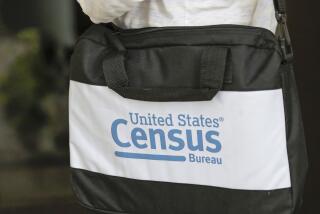Costly Census Mudslinging
The U.S. Census, seemingly a humdrum bit of accounting, was a political powder keg even in 1787, when the founding fathers argued about how measures of wealth, money, livestock and population should be used to determine political representation.
Recently, partisan controversies have centered on the Census Bureau’s use of statistical sampling to supplement its traditional head count.
Sampling is a scientifically credible technique the bureau has used in some form since 1940 to estimate the population missed by other counting methods. However, some House GOP leaders, including the chairman of the census subcommittee, Rep. Dan Miller (R-Fla.), fear that the undercounted minorities and poor people picked up by sampling are likely to be Democratic voters, if they vote.
The most recent tit for tat began in June, when then-Commerce Secretary Bill Daley proposed that the director of the Census Bureau, who favors sampling, be given the final say on whether to release sampled data in April. The ploy means that even if GOP presidential candidate George W. Bush wins in November, a new Commerce secretary could not reverse the rule in time to affect the April release.
On the other side of the battle, Miller is proposing two sweeping investigations of the Census Bureau that could halt its progress toward completing the 2000 count. Both investigations are unwarranted.
Last Wednesday, Miller asked the Government Accounting Office to “begin an immediate investigation” into a bureau event “at the Democratic National Convention in Los Angeles.” Well, not exactly. The Census Bureau was an exhibitor at an Aug. 12 grass-roots USC event to increase minority participation in politics. However, such public education efforts have been specifically encouraged by Congress.
In search of possible errors or wrongdoing, Miller is also pressing the GAO to look at the 4.5 million e-mails that Census Bureau officials exchange every month. Miller’s real target is the bureau’s effort to supplement with statistical sampling the final 2000 census data that will be released April 1. Miller says the e-mail probe is necessary to ensure that the bureau is not beginning sampling prematurely, before completing a traditional head count.
Miller’s tactic could harm California, which lost half a billion dollars in federal funding and one House seat because sampling could not be used in the 1990 census. Federal courts have ruled that sampling still may not be used to decide congressional representation. A court challenge or other long delay could cost California as much as $3 billion in annual federal funding.
Of course, many Democrats are using the census just as shamelessly as the Republicans. Aside from Daley’s ploy, the ranking Democrat on the census subcommittee, Rep. Carolyn B. Maloney (D-N.Y.), made an unsupported charge last week that “we know that George Bush’s Republican Party is opposed to getting an accurate count of America’s blacks, Hispanics and Asians.”
Miller, rather than lending credence to Maloney’s charge, should scale back his investigative effort, limiting it to the specific census offices he has reasonable cause to believe are in need of tighter oversight.
More to Read
Get the L.A. Times Politics newsletter
Deeply reported insights into legislation, politics and policy from Sacramento, Washington and beyond. In your inbox three times per week.
You may occasionally receive promotional content from the Los Angeles Times.









